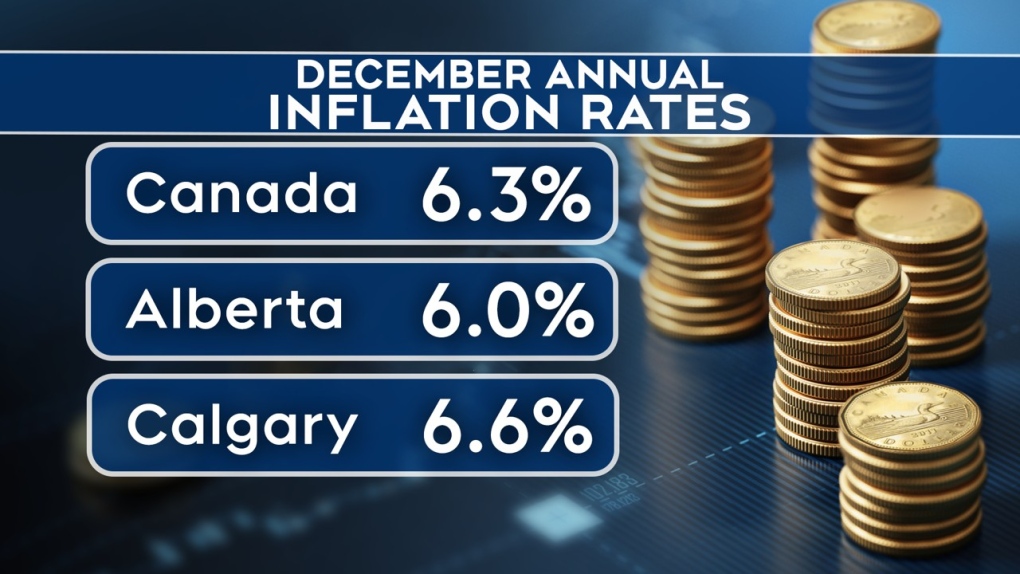Some Calgarians still feel pinch of high food prices even as inflation rate eases
Canada’s annual inflation rate slowed last month but Calgarians are still feeling the pinch as food prices continue to soar.
Trips to the grocery store have brought more stress than success for Rachael Hodgson these past few months.
“It’s just been a struggle,” she told CTV News from the parking lot of Merv’s No Frills in Forest Lawn.
With her child’s daycare, rent and food, Hodgson says there are some items she just can’t afford.
“Milk, certain meats. We went vegetarian because meat is very expensive,” she said.
“I do use the food bank when I can, so that helps a great deal.”
Donna Miller says she also isn’t buying as much as she typically does.
“You’re scared to even go shopping. You can’t get out of here under $100,” she said.
“For seniors, we can’t afford it. We only get so much a month.”
According to Statistics Canada’s latest consumer price index released on Tuesday, the country’s annual inflation rate slowed to 6.3 per cent in December.
Alberta is below the national average at six per cent, while Calgary is even higher at 6.6 per cent.

“Even though they are different, the overall situation is the same. Inflation rates are too high, whether it’s Calgary, Alberta or nationally, and we need to see them come down,” said Robert Roach, deputy chief economist at ATB Financial.
Annual inflation reached a high of 8.1 per cent in June and has been slowly decelerating since.
However, Roach says consumers still aren’t seeing a big difference on the ground.
“Unfortunately, it’s going to take a long time, really the rest of 2023, before we get closer to the target rate of two per cent, which is where we really want to see inflation get to,” he said.
December’s deceleration was partly thanks to gas prices dropping 13.1 per cent from November.
However, food costs remained high, with everything from baked goods to coffee and tea and fresh vegetables up at least 13 per cent.
Calgary Meals on Wheels, which delivers fresh meals to people in the community and to schools, is helping those struggling with rising costs.
“Nutrition, of course, is fundamental to our health and well-being. And it’s often the first thing that we see start to slip when we’re facing challenging times,” said Christine Hentschel, program manger.
“We’re able to provide a sliding fee scale to hopefully fit within everybody’s budget and that way we can keep meals, and healthy meals, affordable.”
Hentschel says they, too, are struggling with high food and gas prices, but are trying not to pass on any inflationary costs to their clients.
“When your organization relies on volunteer efforts to deliver 60 routes every weekday, we understand that our volunteers are also facing some of the same pressures the general community is, so we’re always looking for more volunteers,” she said.
Last month, the Bank of Canada signalled a willingness to press pause on its aggressive rate-hiking system, but most commercial banks expect the central bank to raise its key interest rate by 0.25 per cent next week.
That would bring its key interest rate to 4.5 per cent — the highest it’s been since 2007.
Hodgson is hopeful things will turn around soon.
“It’s very emotional and I can just imagine how it is for other families,” she said.
CTVNews.ca Top Stories

The world begins welcoming 2025 with light shows, embraces and ice plunges
From Sydney to Vladivostok to Mumbai, communities around the world have begun welcoming 2025 with spectacular light shows, embraces and ice plunges.
Poilievre's Conservatives end 2024 hitting long-term high in the polls amid Trudeau resignation calls: Nanos
Pierre Poilievre's Conservatives are closing out 2024 hitting a new long-term high in ballot support, with a 26 point advantage over the Liberals amid calls for Prime Minister Justin Trudeau to resign.
Female victim in Calgary double homicide identified as elementary school teacher
Rocky View School Division (RVSD) on Tuesday identified the woman who was murdered Sunday night in Calgary as Ania Kaminski, an elementary school teacher in Cochrane, west of the city.
Trump says he is planning to attend Jimmy Carter's funeral
U.S. president-elect Donald Trump said Tuesday that he's planning to attend the funeral of former president Jimmy Carter.
What Canadian game show did Alex Trebek host in the 60s? The answer continues to inspire students today
For nearly 60 years, the national Reach for the Top competition has been putting the wits of Canadian students to the test. In 2024, students from about 500 schools across the country participated in the competition.
Telegraph Cove, B.C., fire takes out beloved businesses, parts of boardwalk
The most iconic portion of a picturesque boardwalk in Telegraph Cove, B.C. was destroyed by fire on Tuesday morning.
One arrested following terrifying road rage incident on Hwy. 11 in northern Ont.
Ontario Provincial Police are asking for the public's help in investigating a road rage incident Monday on Highway 11 near Temiskaming Shores.
Nearly all of Puerto Rico is without power on New Year's Eve
A blackout hit nearly all of Puerto Rico early Tuesday as the U.S. territory prepared to celebrate New Year's Eve.
Woman burned to death inside New York City subway is identified
The woman who died after being set on fire in a New York subway train earlier this month was a 57-year-old from New Jersey, New York City police announced Tuesday.


































